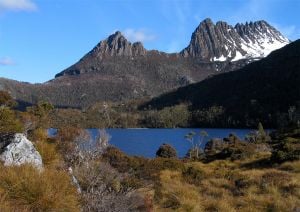Tasmanian Wilderness
| Tasmanian Wilderness* | |
|---|---|
| UNESCO World Heritage Site | |
| State Party | |
| Type | Mixed |
| Criteria | iii, iv, vi, vii, viii, ix, x |
| Reference | 507 |
| Region** | Asia-Pacific |
| Inscription history | |
| Inscription | 1982 (6th Session) |
| Extensions | 1989 |
| * Name as inscribed on World Heritage List. ** Region as classified by UNESCO. | |
The Tasmanian Wilderness is a term that is sometimes used for the World Heritage Area in South West, Western and Central Tasmania, Australia.
There are also other areas in Tasmania that have the elements of being Wilderness areas, and there is also an organisation that has been known as the Tasmanian Wilderness Society.
The World Heritage Area is one of the largest conservation areas in Australia, covering 13,800 km², or almost 20% of Tasmania.
The area constitutes one of the last expanses of temperate wilderness in the world, including the renowned South West Wilderness.
Remains found in limestone caves attest to the human occupation of the area for well over 20,000 years.
Geographic area
The following National Parks and reserves make up the Tasmanian Wilderness World Heritage Area:
- Cradle Mountain-Lake St Clair National Park
- Franklin-Gordon Wild Rivers National Park
- Hartz Mountains National Park
- Mole Creek Karst National Park
- Southwest National Park
- Walls of Jerusalem National Park
- Central Plateau Conservation and Protected Areas
- Devils Gullet State Reserve
Cradle Mountain-Lake St Clair National Park
Cradle Mountain-Lake St Clair is a national park in the Central Highlands areaof Tasmania (Australia), 165 km northwest of Hobart. The park contains many walking trails, most well known of which is the Overland Track. Major features of the park are Lake St Clair and to the north, Cradle Mountain. This park is part of the Tasmanian Wilderness World Heritage Area.
Access from the south (Lake St. Clair) is usually from Derwent Bridge on the Lyell Highway. Northern access (Cradle Valley) is usually via Sheffield, Wilmot or Mole Creek.
In 2005, the Tasmanian Parks & Wildlife Service introduced a booking system & fee for use of the Overland Track over peak periods.
The Tasmanian Government has moved to allow development in national parks and conservations areas. An 'In principle' permit has been granted for the establishment of an 'eco-friendly' resort at Pumphouse Point at Lake St Clair.
The Cradle Mountain-Lake St Clair National Park is a significant location of Tasmania's endemic species - 40-55% of the park's documented alpine flora is endemic. Furthermore, 68% of the higher rainforest species recorded in alpine areas in Tasmania are present in the Cradle Mountain-Lake St Clair National Park. The park's alpine vegetation is very diverse and, has largely escaped forest fires that have caused neighboring regions to suffer.
Animals present in the park include: pademelons, Bennett's wallabies, wombats, possums, ravens and currawongs.
Franklin-Gordon Wild Rivers National Park
Hartz Mountains National Park
Mole Creek Karst National Park
Southwest National Park
Walls of Jerusalem National Park
Central Plateau Conservation Area
Devils Gullet State Reserve
ReferencesISBN links support NWE through referral fees
- Chapman, John, Monica Chapman and John Siseman (2006) Cradle Mountain, Lake St Clair and Walls of Jerusalem National Parks 5th ed. Laburnum, Vic. : J. Chapman. ISBN 1920995013
External links
- World heritage listing for Tasmanian Wilderness
- Tasmanian Parks & Wildlife Service site
- Position of World Heritage Area]
- UNESCO site
- Tasmania's Parks and Wildlife Service page about Lake St. Clair
- Tasmania's Parks and Wildlife Service page about Cradle Mountain
- UNESCO's World Heritage List web page for the Tasmanian Wilderness
- An article touching on the park's flora
- Wikitravel's Cradle Mountain-Lake St Clair National Park site
Credits
New World Encyclopedia writers and editors rewrote and completed the Wikipedia article in accordance with New World Encyclopedia standards. This article abides by terms of the Creative Commons CC-by-sa 3.0 License (CC-by-sa), which may be used and disseminated with proper attribution. Credit is due under the terms of this license that can reference both the New World Encyclopedia contributors and the selfless volunteer contributors of the Wikimedia Foundation. To cite this article click here for a list of acceptable citing formats.The history of earlier contributions by wikipedians is accessible to researchers here:
The history of this article since it was imported to New World Encyclopedia:
Note: Some restrictions may apply to use of individual images which are separately licensed.




